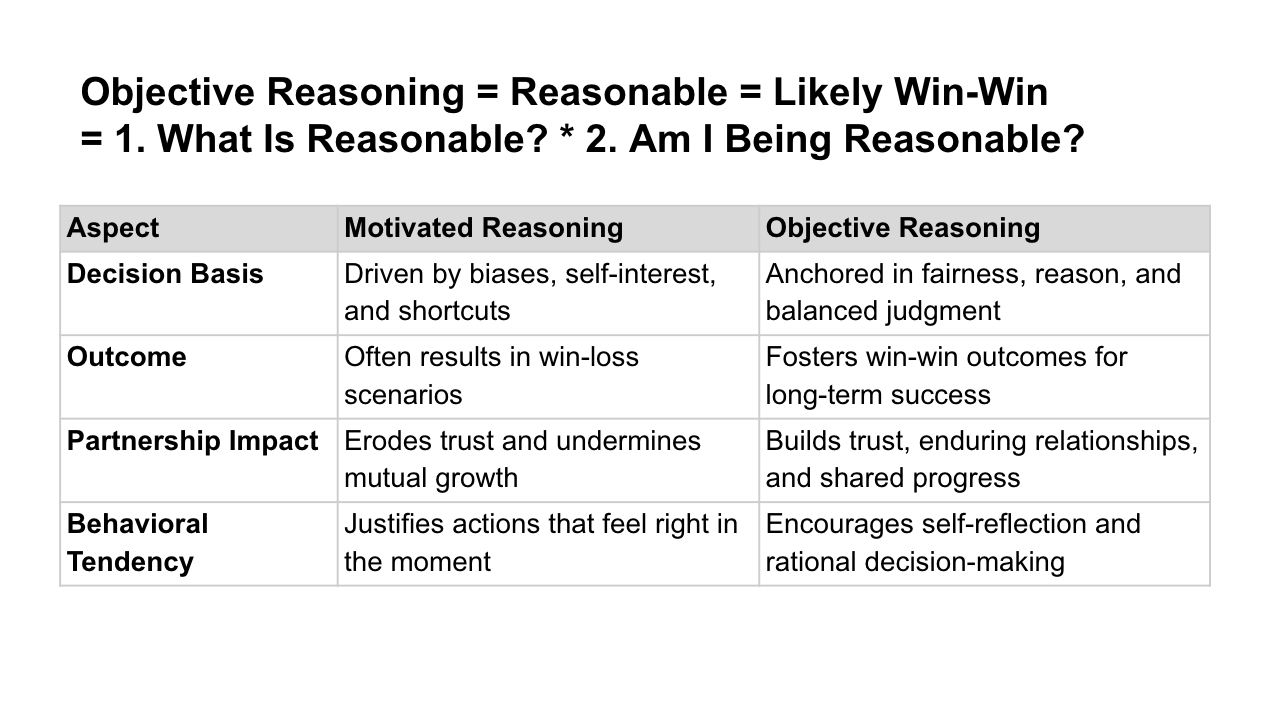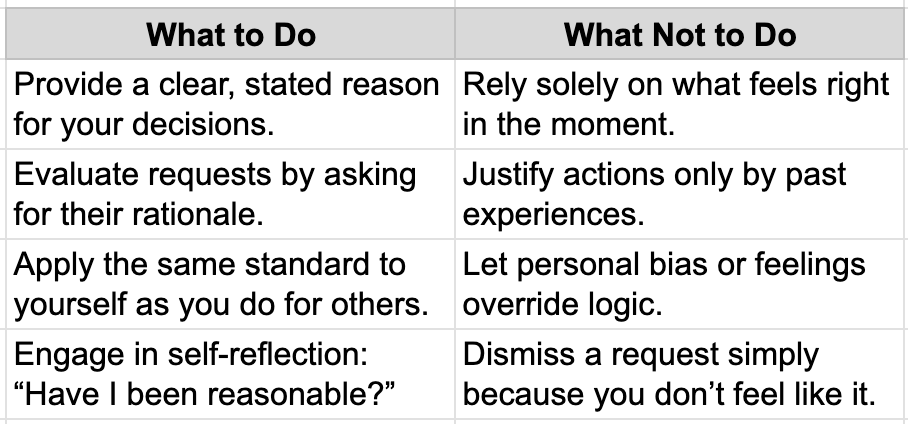Objective Reasoning = Win-Win = 1. What is reasonable? * 2. Am I being reasonable?
Summary:
Motivated Reasoning = Where someone interprets information or makes decisions to align with their desires, biases, or preconceived conclusions. A process that often occurs outside of conscious awareness.
Objective Reasoning: This involves assessing situations or data without letting personal feelings, preferences, or self-interest skew the outcome.
A key heuristic I have to try and Objectively Reason = 1. What is reasonable? * 2. Am I being reasonable?
IMO Good Outcomes = Likely Win-Win = Objective Reasoning = (What Is Reasonable?) × (Have I Been Reasonable?)
Motivated Reasoning, Our Brain’s Default Setting?
Ever notice how easy it is to twist logic into whatever suits you best? That’s motivated reasoning—and it’s typically our brain’s default setting.
Win-Win outcomes often hinge on replacing motivated reasoning with objective reasoning, guided by two simple questions: "What is reasonable?" and "Have I been reasonable?"
Motivated Reasoning is a form of ‘Confirmation Bias’, justifying whatever it is you want to justify.
If you haven’t asked ‘What is reasonable?’ and ‘Am I being reasonable?’, then how do you have any confidence you are being reasonable?
The Best Things Are Selfless And Selfish (Win-Win)
Most of life is a multiplayer game, to get good outcomes over the long term you want ‘win-win’ outcomes for the parties involved. If you have ‘win for you’ and ‘loss for them’ outcomes you are unlikely to have people who want to do long term partnerships with you. Be that in work, friendship or romance.
All else equal:
Objective Reasoning = Doing what is best for you and the other party = Selfless and Selfish = Progress and Harmony = Should actually be what you want to do = Tilting to being fair and balanced (Win-Win) = 1. What is reasonable? & 2. Am I being reasonable?
Motivated Reasoning = Doing what you want which may or may not be the best thing for you and the other party = Likely to be more selfish, and less selfless = Less progress and less harmony = Tilting overly towards yourself (Win-Loss).
Jingles
Win-Win Reasoning: Transforming Bias into Balanced Outcomes.
To be reasonable you need to provide a reason. Without providing a reason it’s almost impossible to be reasonable.
You can’t expect someone else to understand your reason without having said it aloud.
++++++++
Further Thoughts
Partnership Economics - “The Best Things Are Selfless and Selfish.”
I wrote this blog back in 2019!
In summary, the blog uses maths to show how it is likely best to create win-win outcomes, as over time this means you are likely to 1. Have people want to continue being partners with you + 2. You are more likely to have people bring quality new partnership opportunities to you.
The best partners create the most excess value from partnering and split the excess value in the most equitable way.
Negative sum = Party 1 + Party 2 = 1 + 1 = 1.5 (shrinks the pie)
Zero sum = Party 1 + Party 2 = 1 + 1 = 2 (pie is the same size)
Positive sum = Party 1 + Party 2 = 1 + 1 = 3 (grows the pie)
Doing what you want vs Doing what is reasonable
Want to live a good life? Be reasonable and have those around you be reasonable. AKA fight against Motivated Reasoning.
This leads to more progress and more harmony.
Want to be a pain in the bum? Do what you want and think it’s fine because you are a good person, or have good intentions. AKA allow yourself to be taken over by Motivated Reasoning.
This leads to less progress and less harmony. Hanging around with people who do lots of Motivated Reasoning means they want to do what they want much of the time and are annoyed if they don’t get to do this as they think they are right.
Bad Friends / Co-workers vs Good friends / Co-workers
Bad Friends / Co-workers = Push you towards Motivated Reasoning = You are a good person, whatever you did was good = Echo chamber = Likely Win-Loss
Good Friends / Co-workers = Push you towards Objective Reasoning = 1. What is reasonable? * 2. Are you being reasonable? = Ideas lab = Likely Win-Win
Romantic Relationship Example: Don’t worry you’ll find someone vs What was reasonable and were you being reasonable?
Work Example: Your boss doesn’t appreciate you vs What was reasonable and were you being reasonable?
Do’s and Don’ts of Reasonableness
Work example - Handling Feedback and Conflict
Scenario:
You receive constructive criticism from a manager about your role in a team project. Your initial reaction is defensive, attributing the feedback to personal bias.Motivated Reasoning:
Your ego might prompt you to dismiss the feedback as unfounded, reinforcing your existing self-image rather than examining the merit of the criticism.Objective Reasoning in Action:
Ask yourself, “What is reasonable?” Analyze the feedback objectively, looking at examples and data. Then question, “Have I been reasonable?” Reflect on whether you’re open to improvement or simply defending your ego. By doing so, you can engage in a productive discussion with your manager and make adjustments that benefit both you and the team.
Romantic relationship example - Time Prioritisation
Scenario:
One partner frequently cancels date nights and stays late at work without notice. Over time, the other partner begins to feel neglected and taken for granted.Motivated Reasoning:
The busy partner might justify their behaviour by thinking, “My work is important, and my partner should understand that success requires sacrifice,” overlooking the emotional needs of the relationship.Objective Reasoning in Action:
Instead of defaulting to self-interest, they pause to ask, “What is reasonable?” and “Have I been reasonable?” They recognise that quality time is essential for nurturing their connection. By reassessing their priorities, they decide to block out dedicated time for the relationship—perhaps scheduling weekly date nights or setting boundaries around work hours—to ensure both partners feel valued.
If you only take away one thing
Fighting Motivated Reasoning with reasonableness (Objective Reasoning) leads to progress and peace.
Start today—next time you’re tempted to justify something, ask: Is this reasonable, and am I being reasonable?


